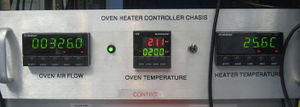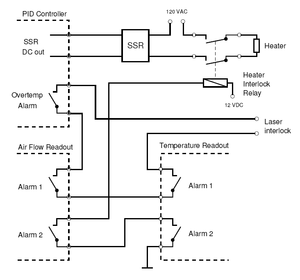Difference between revisions of "Oven Control"
| Line 1: | Line 1: | ||
| + | == Introduction == | ||
| + | |||
| + | Pressurized dry and filtered air at room temperature is provided by a dedicated compressor in the Hall. The air enters the system through a shut-off valve and a pressure regulator, which is typically set to an output pressure of 15 psi. The flow rate is measured with a gas velocity sensor (Omega model FMA-905) connected to a display unit (Omega DP41-E-S2R) that provides an alarm to indicate insufficient flow. The air then passes through two resistive heaters (120 VAC, 1200 W) and continues through insulated copper tubing into the target oven. The oven material is ceramic which can withstand a temperature of at least 300C continuously. The air finally exits the system through an exhaust pipe where it can cool down. Both inlet and exhaust pipes are inside the oven supporting tube filled with insulation material. | ||
| + | |||
| + | A 100Pt RTD (Omega model F3105) measures the temperature inside the oven. A process controller (Omega CN77540-C2) operating in PID mode drives the heater via a solid-state relay (SSR) regulating the heater power dependent on the temperature detected by the RTD. The SSR (Omega model SSR240DC10) accepts a low-voltage (3 − 32 VDC) control signal of about 30 mA. A mechanical relay between the SSR and the heater allows interruption of the 120 VAC heater power in case of a malfunction. | ||
| + | |||
| + | A thermocouple (Omega 5SC-GG-K-30-36) is mounted on the tubing right after the heater to allow monitoring of the temperature of the air exiting the heater. Another display unit (Omega DP41-TC-S2R) reads the thermocouple and generates an alarm if the temperature exceeds a preset threshold. | ||
| + | |||
| + | The PID controller as well as the two display units are installed in a 19” chassis in the electronics racks on the second floor of the counting house where they can be manually operated if necessary. All other components are located in the Hall in the vicinity of the target. The instruments can be monitored and programmed remotely via serial RS-232 communications, which allows convenient control via an EPICS/MEDM graphical user interface (GUI) in the counting house. | ||
| + | |||
[[Image:oven_control.jpg|thumb|Oven Controller Panel]] | [[Image:oven_control.jpg|thumb|Oven Controller Panel]] | ||
[[Image:oven_connection.png|thumb|Oven Controller Connection Diagram]] | [[Image:oven_connection.png|thumb|Oven Controller Connection Diagram]] | ||
[[Image:alarm_control.png|thumb|Oven Controller Alarm Diagram]] | [[Image:alarm_control.png|thumb|Oven Controller Alarm Diagram]] | ||
Revision as of 23:50, 3 November 2008
Introduction
Pressurized dry and filtered air at room temperature is provided by a dedicated compressor in the Hall. The air enters the system through a shut-off valve and a pressure regulator, which is typically set to an output pressure of 15 psi. The flow rate is measured with a gas velocity sensor (Omega model FMA-905) connected to a display unit (Omega DP41-E-S2R) that provides an alarm to indicate insufficient flow. The air then passes through two resistive heaters (120 VAC, 1200 W) and continues through insulated copper tubing into the target oven. The oven material is ceramic which can withstand a temperature of at least 300C continuously. The air finally exits the system through an exhaust pipe where it can cool down. Both inlet and exhaust pipes are inside the oven supporting tube filled with insulation material.
A 100Pt RTD (Omega model F3105) measures the temperature inside the oven. A process controller (Omega CN77540-C2) operating in PID mode drives the heater via a solid-state relay (SSR) regulating the heater power dependent on the temperature detected by the RTD. The SSR (Omega model SSR240DC10) accepts a low-voltage (3 − 32 VDC) control signal of about 30 mA. A mechanical relay between the SSR and the heater allows interruption of the 120 VAC heater power in case of a malfunction.
A thermocouple (Omega 5SC-GG-K-30-36) is mounted on the tubing right after the heater to allow monitoring of the temperature of the air exiting the heater. Another display unit (Omega DP41-TC-S2R) reads the thermocouple and generates an alarm if the temperature exceeds a preset threshold.
The PID controller as well as the two display units are installed in a 19” chassis in the electronics racks on the second floor of the counting house where they can be manually operated if necessary. All other components are located in the Hall in the vicinity of the target. The instruments can be monitored and programmed remotely via serial RS-232 communications, which allows convenient control via an EPICS/MEDM graphical user interface (GUI) in the counting house.


